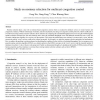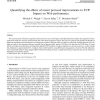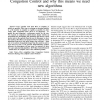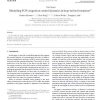COMCOM
2006
14 years 26 days ago
2006
Nominee selection plays a key role in nominee-based congestion control, which is essential for multicast services to ensure fairness and congestion avoidance. Without valid design...
COMCOM
2006
14 years 26 days ago
2006
We assess the state of Internet congestion control and error recovery through a controlled study that considers the integration of standards-track TCP error recovery and both TCP ...
CN
2006
14 years 26 days ago
2006
In this article, we propose a new single-rate end-to-end multicast congestion control scheme called Explicit Rate Multicast Congestion Control (ERMCC) based on a new metric, TRAC ...
CCR
2006
14 years 26 days ago
2006
Users typically want their flows to complete as quickly as possible: They want a web-page to download quickly, or a file transfer to complete as rapidly as possible. In other words...
CORR
2008
Springer
14 years 27 days ago
2008
Springer
Existing transport protocols, be it TCP, SCTP or DCCP, do not provide an efficient congestion control mechanism for heterogeneous wired-cum-wireless networks. Solutions involving i...
CN
2008
14 years 28 days ago
2008
This paper addresses the problem of fair allocation of bandwidth resources on lossy channels in hybrid heterogeneous networks. It discusses more particularly the ability of window...
AUTOMATICA
2007
14 years 28 days ago
2007
In this paper we study communication networks that employ drop-tail queueing and additive-increase multiplicative-decrease (AIMD) congestion control algorithms. We show that the t...
ADHOC
2007
14 years 29 days ago
2007
— The problem of congestion in sensor networks is significantly different from conventional ad-hoc networks and has not been studied to any great extent thus far. In this paper,...
CCS
2010
ACM
14 years 1 months ago
2010
ACM
Congestion control algorithms seek to optimally utilize network resources by allocating a certain rate for each user. However, malicious clients can disregard the congestion contr...
ETM
2010
14 years 1 months ago
2010
Re-inserted ECN (re-ECN) is a proposed TCP/IP extension that informs the routers on a path about the estimated level of congestion. The re-ECN protocol extends the Explicit Congest...




